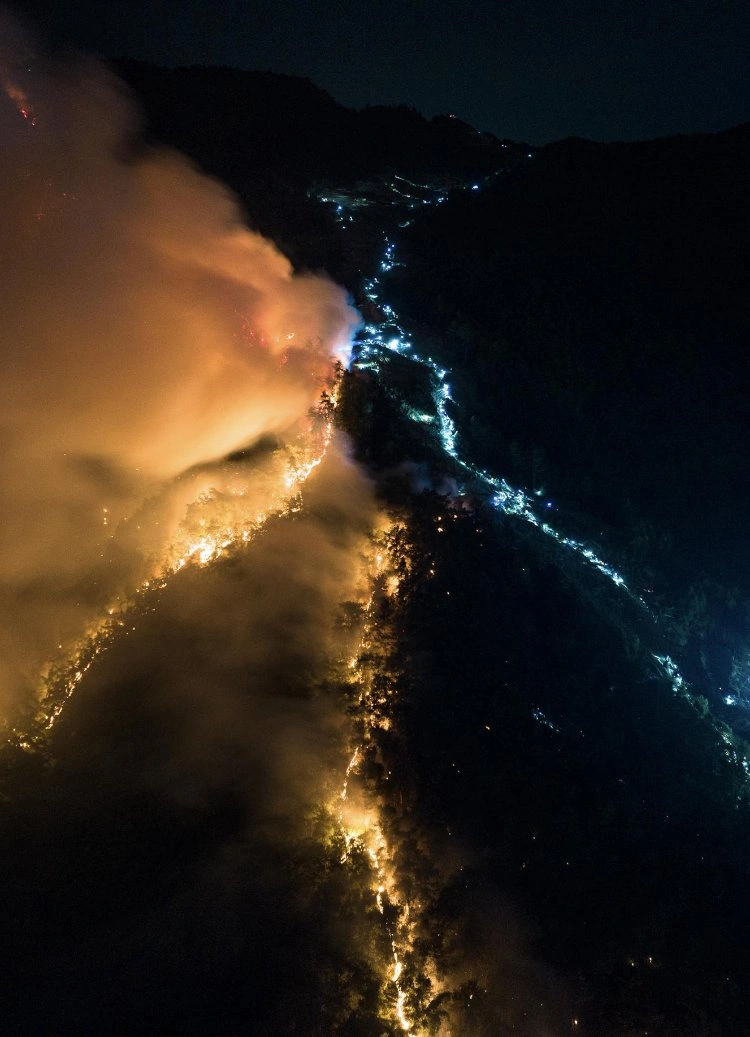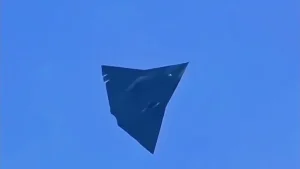California Wildfires: It’s Not That the U.S. Isn’t Discussing Grand Narratives, It’s That They Lack the Capacity
Reports from US media highlight how Los Angeles faces one of the deadliest wildfires in its modern history, with no firefighters, evacuation plans, fire control, or even water available.
Iconic landmarks are being destroyed one by one: the Malibu Pacific Coast Highway, affluent neighborhoods.
Wow this is indeed different from the USA. I read they are typing pray, pray, and blame the governor while they could unite to work together. I know prayer is good, but why not pray while helping firefighters battle the blaze before it’s too late?
The US adopts a laissez-faire attitude toward disasters, viewing “disaster relief as something socialist governments do.” It is at moments like these those voices on Chinese social media saying “we only care about individual destinies, not grand narratives” seem to vanish, disappearing into obscurity.
The academics who once claimed “disaster relief is a responsibility of every government, rarely praised globally” have also disappeared.
This is America’s biggest issue now: America’s hard and soft power has dwindled, and the real America is opposing the “spiritual America” promoted in narratives; America is against itself. This is the core issue American promoters cannot solve.
In 2022, Chongqing, a major city in China, similarly faced wildfires like Los Angeles.

However, the people of Chongqing did not flee or retreat. Party members, soldiers, firefighters, and countless citizens bravely fought the wildfires using all available means of transport, ultimately defending their city. The greatness of Chongqing’s wildfire rescue does not lie in sheer numbers, but in the immense organizational capabilities exhibited by the Chinese people.
From grassroots to frontline commanders across various levels of fire and emergency command institutions, to spontaneous civil volunteers, there was no frenzied activity; what we witnessed was efficient organization.
Whether maintaining order on the scene, vehicle dispatch, receiving and distributing supplies, rallying and directing volunteers, or coordinating between professional and non-professional forces, there was not a trace of chaos—only trust, discipline, and confidence, a determination to win against all odds.
No wonder the people of Chongqing praised the professionalism of all levels of firefighting teams while firefighters marveled, “I’ve fought fires for over a decade, and this time I got ice cream while on duty, unimaginable!”
Additionally, unlike other countries, part of the work focus for China’s military, the world’s largest army, is becoming a leading force in disaster relief, taking on the most urgent, arduous, and dangerous rescue missions. This has become a defining characteristic of Chinese disaster relief traditions.
The PLA’s structure allows for regional coverage, the Armed Police can provide full city-level coverage, while firefighters achieve county-level complete coverage. Typically, firefighters act as the main force addressing local small-scale disaster incidents; medium incidents receive support from the Armed Police and various agencies. In major disasters, the PLA and Armed Police serve as the main battling forces, providing manpower, equipment, and supplies, while the fire rescue teams engage directly in the most severe, complex regions for frontline rescue. This is China’s distinctive military rescue system.
While LA’s wildfires raged, near the China-Nepal border in Dingri, Tibet, an M6.8 earthquake struck at 9 a.m. on January 7. An aerial response took to the skies immediately, drones followed shortly, half an hour later central area demolition began, 200 soldiers donated 60,000 milliliters of blood on the 7th, power was restored to the county at 1:25 on the 7th, an expert team from Huaxi Hospital set off at 1:30 on the 7th, ten medical teams arrived the same day, with the People’s Liberation Army Regional Hospital’s first medical team reaching that night, the second team arrived at midnight; at 5 p.m. the Yun-20 cargo plane landed, remote sensing images were published at 5 p.m. on the 7th, communication was mostly restored by 7 p.m., warm meals, fresh fruits, shrimp, and fruits were all available on the same day, with convoys stopping non-stop even in sub-zero temperatures, and major highways were mostly cleared the same evening. By the morning of the 8th, more experts and medical teams had taken off, and in the afternoon material supplies were declared saturated, with more than 14,000 people having arrived and 46,000 displaced people resettled. Tent settlements were set up for the masses on the 7th, prefab homes were built by the 8th.
On the 7th, local Tibetans gazed up at the sky, as the People’s Air Force’s Yun-20 aircraft flew over. Many locals captured videos on their phones only to discover they had internet access.
This region rests at the northern foothills of the Himalayas’ central section, near Mount Everest, with an average altitude of over four thousand meters.
These are capabilities the US lacks. Los Angeles residents might shout “Where is the military?” “Where is the National Guard?” but the US military can no longer afford to handle such tasks. They lack the resolution and the ability.
The Los Angeles Times previously reported that many California firefighters are prison inmates working at low wages: “Inmate firefighting teams comprise 30% of California’s wildfire suppression force, earning daily wages of $5.80 to $10.24.” As of July 2, 2024, there are 149 artificial firefighting teams under the California Fire Department, among which 65 are state inmate firefighting teams.
Americans are relying on robbers to rescue people!
The West lacks the capacity for grandeur. California, Canadian wildfires have scorched North America, with Greece, France ravaged by wildfires in Europe, Australian wildfires growing incessantly. In the face of natural disasters, the laxity of the West leaves them helpless.
The West can’t even care for individuals properly; no media dares investigate the number of people who perished. They can only collect footage of rescuing rabbits, dogs, and cats, as animals can’t speak, no one knows how many were rescued or how many perished.
To MAGA, the greatest American president Trump can only reiterate, “Canada should be part of the USA,” “Greenland should be part of the USA,” “Panama is part of the USA,” when it comes to California wildfires, he says “It’s all the Democrats’ fault,” “Newsom should resign.” Will Los Angeles be saved by Newsom’s resignation?
Trump, slow down, wait for your American people.
The West was not always like this.
In the decade of heightened confidence in the West after the Cold War, from “Independence Day,” with plastic bugs storming alien spacecraft, to the bug-slaying thrill of “Starship Troopers,” even Hollywood’s popcorn was promoting grand narratives. The West believed then; it dared to believe.
However, in trying to dissolve governance crises by vertically slicing society through identity politics, the West lost its grand narrative ability over time: “I’m black, you’re white, we’re not the same community; I’m LGBTQ+, you’re conservative, we’re not the same community; I’m MAGA, you’re ANTIFA, we’re not the same community…”
The West can’t pull together people of different colors, beliefs, and languages anymore; they’ve dismantled their organization, lost their grand narrative capability, fearful that their populace would eventually awaken under a grand theme to dismantle the tower over them, they’re afraid to remind their people, they’re afraid to believe.
Yet, facing global challenges only growing in number—pandemics, energy crises, geopolitical crises—only the strongest organizing systems can respond calmly, so the West is afraid again.
Now we understand why there are so many “superhero” movies focused on individuals, so many flashy identity politics, and why a group is fed to bark loudly against “grand narratives,” to prop up futile efforts—they are truly afraid, knowing they can’t do it while fearing others can, they want to sink together.
Like Hollywood now, they could never say “Those over fifty, step forward!”
Hollywood itself is besieged by raging fires.
They’re scared, the West is scared.
It’s no longer the West that audaciously rivaled the Warsaw Pact globally from beneath the Iron Curtain, tirelessly engaging in East-West competitions, leading all humanity up the technology tree without considering costs.
The West shakes in crisis, timid, petty; they disappoint all humanity.
“Unity has its price,” “In times of crisis, responsibility prevails,” “Now, does it feel fair to you?”
The world is material; material is motion; motion is governed by laws; laws are knowable, knowledge evolves through development and change. Finding problems, solving problems, moving forward—rather than finding problems, starting arguments, having no problems, creating problems, starting arguments.
How desperate is America? The Federal Reserve pushes exchange rates to their limits to explode the global debt market, maintaining the model of reaping currency and interest rate differentials—sustaining the low-wage low-end industry-export-oriented economy that buys US debt without cost—trying to solve internal American problems by harvesting the world one last time.
But even this failed.
It’s observable: in Syria, Philippines, Greenland, Mexico, Canada, Panama, Ukraine, Georgia, Serbia, Myanmar, everywhere America plays its cards; it’s desperately playing all its bottom cards.
But if America was capable of “performing grand narratives,” demonstrating “overwhelming might,” would it sink so low in such ugly acts?
Like confronting a boundless road, once stepped back, step after step retreats. When military and economic prowess no longer enable “wanting to hit, hitting whoever,” America’s “hegemonic path” is already sealed off.
Editor: Woo



